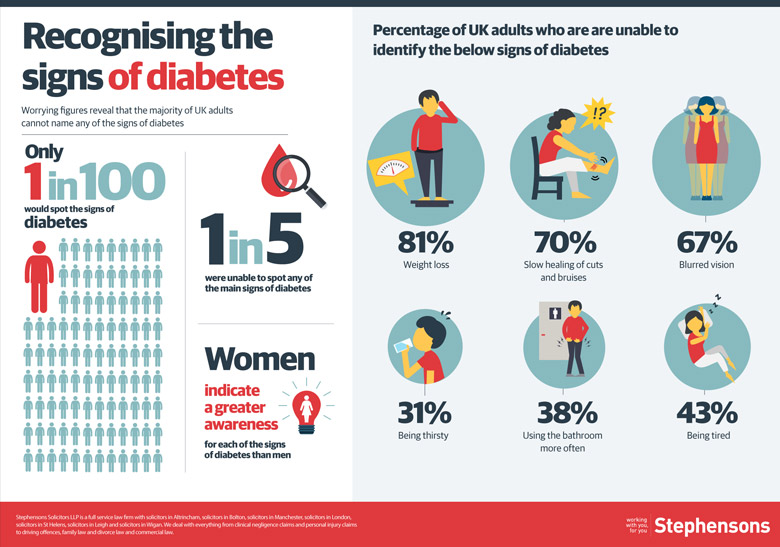Worrying figures published by the national law firm, Stephensons, reveal that only one per cent of UK adults are able to identify the main signs of diabetes although one in 20 battle the disease.
The study, reveals that most people cannot list the six main signs of diabetes and one in five cannot spot any of the signs. According to the NHS, 3.9 million people are diagnosed with diabetes each year whilst an estimated 590,000 are unaware that they have the disease.
According to the study, more than 80 per cent of people would fail to spot weight loss as a sign of diabetes, despite this being listed by the NHS as one of the main symptoms. In fact, one in three would wrongly identify weight gain as a symptom, due to increased awareness of the link between obesity and diabetes.
Excessive thirst is the most recognised symptom, with around half of men and two thirds of women being able to spot it.
Half of the men polled would not find any cause for alarm when visiting the bathroom more frequently than normal. However, this is likely to cause concern for the majority of female respondents, who showed higher awareness across all signs.
The study indicates that diabetes awareness is at its highest among the over-55’s, where the risk of developing the condition is also often increased. However, cases of diabetes are rapidly increasing amongst children and juveniles in the UK. Stephensons found that those between the ages of 18-24 were least likely to accurately identify the signs of diabetes.
Blurred vision and poor healing of cuts and bruises were also widely missed by those surveyed.
The prevalence of diabetes in the UK is estimated to rise to five million by 2025. Undiagnosed and untreated, it can lead to serious illness, amputation and even death.
John Bennett, whose leg was amputated after NHS staff missed the signs of diabetes, said: “I got bitten on the leg by a spider which started to swell and become really sore. I was a nurse myself, at the time, so I cleaned and dressed the wound but the pain was getting worse, so I went to the doctor to get them to take a look at it.
“In hindsight, the fact that my immune system was responding in that way should have been a warning, but it simply didn’t cross my mind. The doctor should have checked me for diabetes there and then – but they didn’t.
“By the time they realised and carried out the tests, it was too late and there was nothing they could do to save my leg.
“My real passion was motorbikes. I’ve had 9 or 10 different models, going back to 1970s. I’d customise them, restore them and ride them – but of course, that had to change. I couldn’t hold on to the side of a bike anymore.
“I’ve gone from being a reasonably fit bloke who was losing weight, exercising, swimming to someone who couldn’t do anything”.
Claire Mooney at Stephensons, who commissioned the study as part of World Diabetes Day, said: “We see many cases where diabetes has gone unspotted until it is too late. This lack of awareness is present across the United Kingdom, not only amongst individuals, but also health professionals alike.
“Preventable amputations as a result of diabetes are more prevalent than many think. Knowing the signs yourself will ensure you are never in a situation where such a serious condition remains undiagnosed, potentially leading to disability or even death.
“It is clear that more needs to be done to tackle the lack of awareness around diabetes and its life changing effects.”
ENDS
Stephensons is a national full service law firm 470 staff and ten offices across the country. For more information about the study, contact the Stephensons Press Office, on: 01616 966 229 , or if your enquiry is urgent; 01616 966 229. Alternatively, contact Triin Barrow; Triin.Barrow@Stephensons.co.uk or Robert Davies; Robert.Davies@Stephensons.co.uk.
For more information on World Diabetes Day, contact the International Diabetes Federation, or visit their website.


